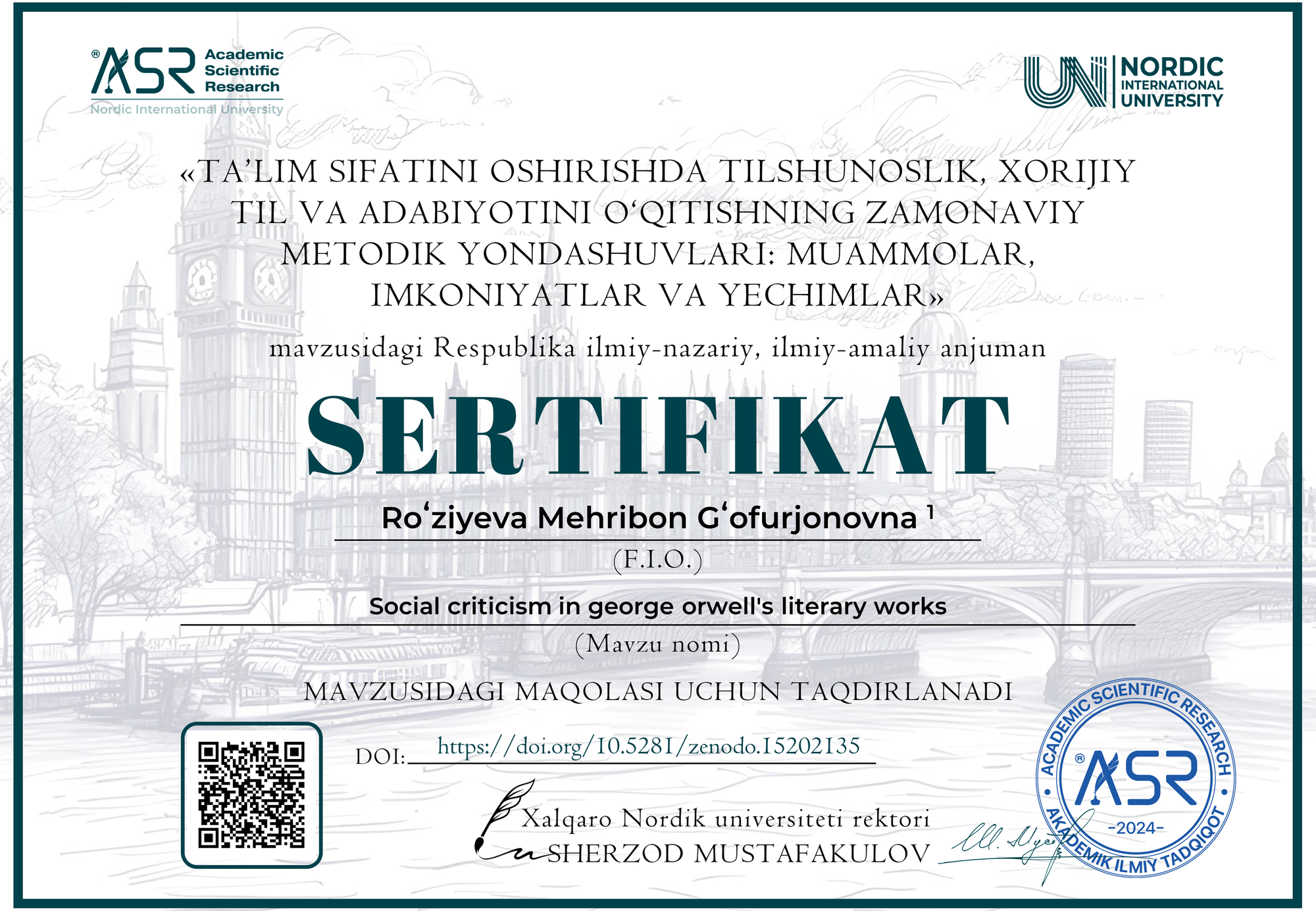Roʻziyeva Mehribon Gʻofurjonovna 1

DOI: https://doi.org/10.5281/zenodo.15202135
Google scholar: https://scholar.google.com/scholar?hl=ru&as_sdt=0%2C5&q=%22SOCIAL+CRITICISM+IN+GEORGE+ORWELL%27S+LITERARY+WORKS%22&btnG=
Zenodo community: https://zenodo.org/records/15202135
Nordic_press journal: https://research.nordicuniversity.org/index.php/nordic/article/view/2351
MAQOLANI YUKLAB OLISH
SERTIFIKATNI YUKLAB OLISH
REVIEW:
The thesis titled "Social Criticism in George Orwell's Literary Works" by Roziyeva Mehribon Gʻofurjonovna delves into the profound social critiques embedded in the renowned works of George Orwell, particularly in Animal Farm (1945) and 1984 (1949). Through an engaging analysis, the thesis explores how Orwell uses allegory, satire, and dystopian narratives to comment on political systems, the abuse of power, and the manipulation of truth. This work demonstrates the lasting relevance of Orwell’s critiques, especially when compared to contemporary socio-political concerns such as government control, surveillance, and the suppression of individual freedoms.
The thesis is divided into well-structured sections that effectively tackle key aspects of Orwell's works. The introduction provides an insightful background on Orwell's political engagement, establishing the context for his critiques. The study emphasizes Orwell's relentless exposure of totalitarianism and the ways in which those in power can distort language and reality to maintain control. The discussion is not limited to a historical analysis but extends to the contemporary political climate, making Orwell’s observations still pertinent today.
In the Literature Review section, the author references a range of scholarly interpretations of Orwell’s works, noting the central themes of betrayal, power dynamics, and the perversion of revolutionary ideals. The comparison of Orwell's political concerns with modern political manipulation and the rise of authoritarianism effectively underscores the timeless nature of his warnings. The thesis references significant works and provides strong foundational support for the discussion, such as Kinna's work on Animal Farm and Gray’s analysis of 1984, offering a nuanced understanding of Orwell’s methods and messages.
The Methodology section outlines the approach taken in the thesis, specifically focusing on textual analysis, comparative approaches, and historical contextualization. The detailed readings of Animal Farm and 1984, with a focus on Orwell's use of allegory and dystopian settings, are key to understanding how Orwell critiques the socio-political dynamics of his time. The comparative approach that juxtaposes Orwell's depiction of political systems and social issues against modern-day scenarios helps make the argument more relatable to contemporary readers.
One of the strengths of the thesis is its deep dive into Orwell's use of allegory and satire in Animal Farm. The thesis does a commendable job of highlighting how Orwell critiques the betrayal of the proletariat during the Russian Revolution, using the farm animals as metaphors for the disillusioned working class. The famous line “All animals are equal, but some animals are more equal than others” is examined in-depth, emphasizing Orwell’s critique of political hypocrisy and the corrupting influence of power.
Similarly, the discussion on 1984 explores Orwell's portrayal of totalitarianism, surveillance, and the manipulation of truth. The concept of "doublethink," as explained in the thesis, is a powerful symbol of the regime's control over reality, showing how the state erodes the individual’s ability to perceive the truth. The thesis outlines the chilling implications of Orwell’s dystopian society, offering readers a thought-provoking reflection on the dangers of an all-encompassing government that invades both the public and private spheres.
Another critical aspect of the thesis is its examination of Orwell’s critique of language as a tool for control. The introduction of Newspeak in 1984 and the distortion of language in Animal Farm are explored in detail, demonstrating how Orwell's works expose the dangers of linguistic manipulation as a means of suppressing dissent and controlling thought. This discussion ties into Orwell's larger warning about the potential for governments to manipulate not only political structures but also the very ways in which individuals think and communicate.
The Conclusion effectively summarizes the key findings of the thesis, reiterating how Orwell's works serve as enduring critiques of political power and its potential to corrupt. The study emphasizes that Orwell’s warnings about totalitarianism, the manipulation of truth, and the abuse of power remain pertinent today, as issues like surveillance and political manipulation continue to challenge democratic values. Orwell’s critiques, especially regarding the concentration of power, the suppression of individual freedoms, and the distortion of truth, resonate powerfully in today's socio-political climate.
Overall, the thesis provides a thorough and insightful analysis of George Orwell's works, offering readers a deeper understanding of the social and political criticism embedded in Animal Farm and 1984. By effectively connecting Orwell’s concerns with modern-day issues, the thesis underscores the relevance of his work and invites readers to reflect on the implications of unchecked power in our own society. The research is well-supported by scholarly sources and offers a comprehensive perspective on Orwell’s literary legacy.



